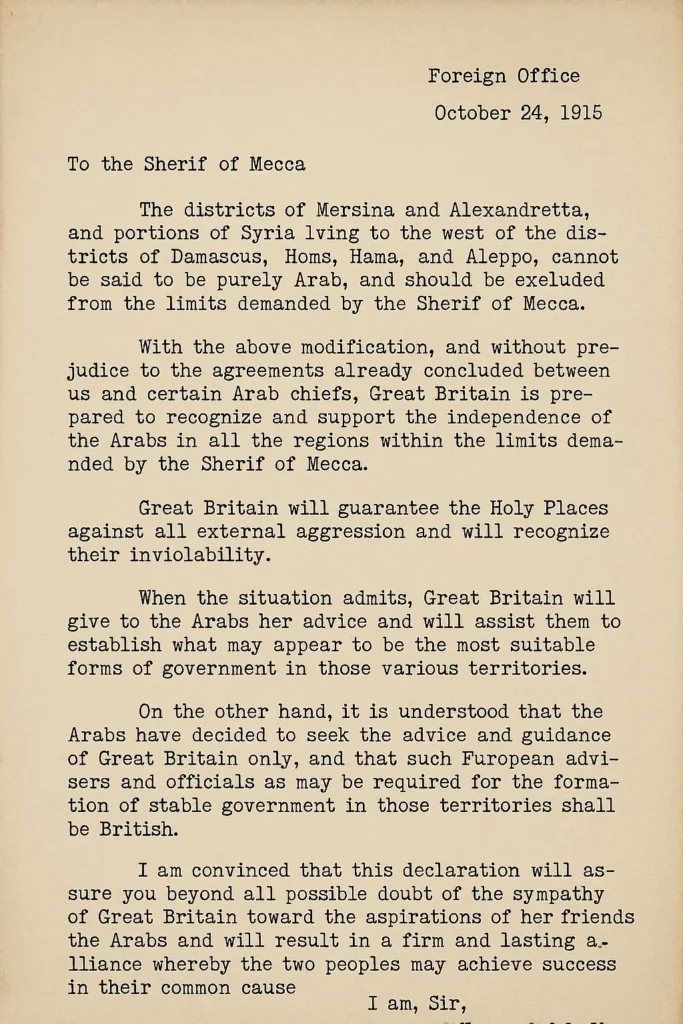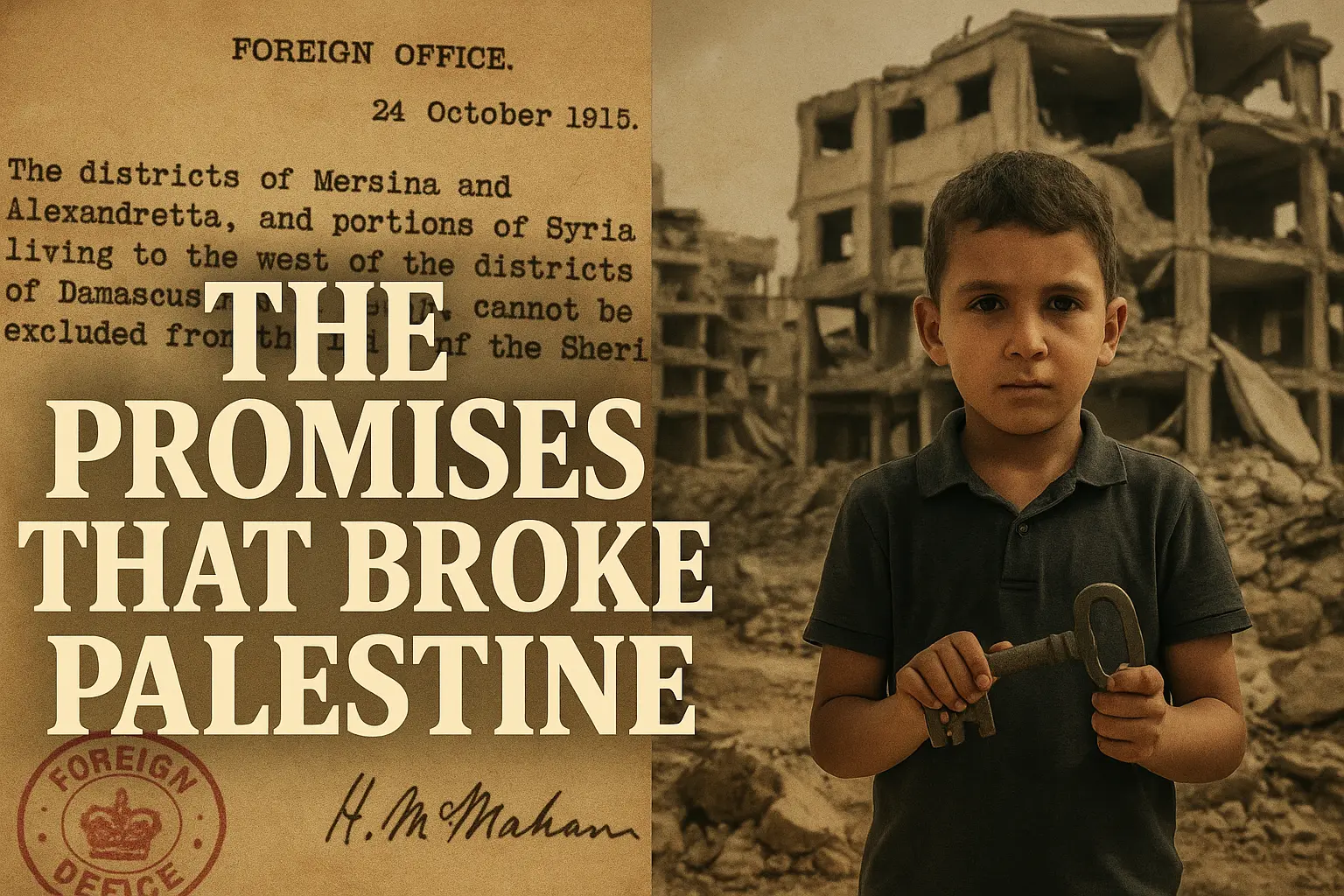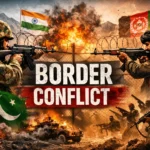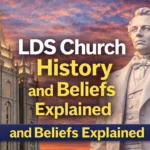From World War I’s contradictory pledges to a modern lawsuit, Palestinians say Britain bears responsibility for a century of dispossession and they’re demanding acknowledgment, justice, and reparations.
The War That Redrew the Map
In 1914, World War I engulfed empires. The Ottomans ruled much of the Arab world, and Britain sought to dismantle their domain. In doing so, London made three overlapping promises that would shape Middle Eastern politics for generations.
📝 Promise 1: Arab Independence (1915–1916)

Through the Hussein–McMahon Correspondence, Britain pledged to recognize and support Arab independence in exchange for revolt against the Ottoman Empire. The Arabs believed this included Palestine.
📜 Visual 1: Facsimile of McMahon Letter (Oct 24, 1915)
“Great Britain is prepared to recognize and support the independence of the Arabs…”
— Sir Henry McMahon, Foreign Office, 1915
🗺️ Promise 2: The Secret Carve-Up (1916)
Behind closed doors, Britain and France signed the Sykes–Picot Agreement, dividing Ottoman lands into colonial zones. Palestine was marked for “international administration,” but Britain soon took the lead — setting the stage for direct control.
📷 Visual 2: Map Sequence

From Ottoman rule to Sykes–Picot and the U.N. Partition (1914–1948)
✡️ Promise 3: A Jewish National Home (1917)
The Balfour Declaration publicly endorsed “a national home for the Jewish people” in Palestine, while vaguely assuring that the rights of “existing non-Jewish communities” would not be harmed.
These contradictions — independence for Arabs, partition with France, and Zionist settlement — were never reconciled.
The Mandate Years: Policy by Contradiction (1920–1948)
Following the Ottoman collapse, the League of Nations granted Britain the Mandate for Palestine. Officially, it was to prepare the region for self-rule; in practice, it became a tool of empire.
- Demographic engineering: Jewish immigration grew from 60,000 to 600,000.
- Land transfers: Zionist organizations purchased land from absentee landlords, displacing tens of thousands of Palestinian tenants.
- Suppression: The 1936–39 Arab Revolt was crushed by British troops, deepening resentment.
- Broken pledges: The Arab independence promised in 1915–16 never materialized.
📊 Visual 3: Population Chart (1920–1946)
Jewish and Palestinian Arab populations under the British Mandate

Partition and the Nakba (1947–1948)
Unable to control the conflict, Britain handed the matter to the United Nations, which in 1947 proposed a partition plan creating separate Jewish and Arab states.
- Jewish leadership accepted; Arabs rejected, calling it an injustice.
- Britain withdrew in May 1948.
- The result was war — and the Nakba, the mass displacement of over 700,000 Palestinians, many never to return.
📷 Visual 4: Historical Photo Collage
British troops patrol Jerusalem, the 1936 Arab Revolt, and refugees fleeing in 1948.

The Modern Reckoning: “Britain Owes Palestine”
Now, over a century later, a group of Palestinian lawyers and activists are suing the UK government. The “Britain Owes Palestine” campaign argues that Britain’s actions during and after the Mandate amount to:
- Breach of international law — for denying Arab self-determination.
- Facilitation of dispossession — by enabling mass immigration and land seizures.
- Moral culpability — for abandoning Palestine to chaos and violence it helped create.
They are demanding acknowledgment, apology, and reparations for what they call “a century of oppression.”
The UK’s Legacy and Today’s Policy
Since 1948, Britain has aligned closely with Israel, maintaining arms trade and diplomatic backing, even amid repeated Gaza offensives.
Yet, in a symbolic shift, the UK has signaled readiness to recognize a Palestinian state — a century after first writing “Palestine” into its mandate charter.
But for Palestinians, this gesture feels too late and too limited.
They argue that Britain’s colonial fingerprints are still visible — in borders, in refugee camps, and in the ongoing denial of nationhood.
Why It Matters Now
- Legal accountability vs. historical memory: Whether the courts accept the case or not, it reignites debate over colonial responsibility.
- Decolonization lens: The campaign reframes Palestine not merely as a geopolitical dispute, but as unfinished decolonization.
- Policy implications: Acknowledgment could pressure London to recalibrate arms sales, recognition policy, and humanitarian aid frameworks.
Conclusion: A Century’s Shadow
Britain may no longer rule an empire, but its legacy endures in Palestine’s fractured landscape.
From the Hussein–McMahon letters to the Balfour Declaration, its words reshaped destinies — promises that bred contradictions, and contradictions that bred catastrophe.
For Palestinians, justice begins not only with recognition — but with reckoning.










